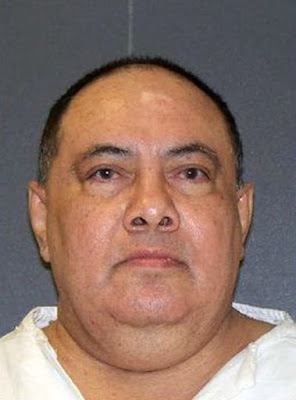Lawyers for convicted killer Robert Moreno Ramos have argued that he wasn’t aware of his rights under an international treaty, and therefore didn't receive proper legal counsel during his trial and sentencing.
Texas plans to carry out the execution of Robert Moreno Ramos by lethal injection on Wednesday evening, amid his lawyers’ continued pleas that the case be re-examined for legal violations from 25 years ago.
Ramos, 64, was convicted of capital murder in March 1993 for the February 1992 killings of his wife, Leticia, 42, and their 2 children, Abigail, 7, and Jonathon, 3, in Hidalgo County.
Ramos, a Mexican national, beat his wife and children with a miniature sledgehammer, and then buried them under the bathroom floor in the family’s Progreso home, according to trial evidence.
Ramos’ case has been a point of contention in both district and federal courts for years, due to requirements of an international treaty. The Vienna Convention on Consular Relations mandates that when an immigrant is arrested and held in detention, he has the right for the consulate to be notified so that the foreign government can provide legal representation.
Lawyers in Ramos’ case have argued in appeals since 1996 that Ramos wasn’t aware of his rights, and therefore didn’t receive sufficient legal guidance that they say could have made a difference in his sentencing.
His current lawyer wrote in a 2015 filing that Ramos was instead represented by court-appointed, “incompetent counsel” who was poorly trained and failed to present “mitigating evidence” at his conviction and sentencing that disregarded Ramos’ brain damage and history of severe mental illness, as well as his upbringing marked by “shocking brutality and desperate poverty.”
On Feb. 7, 1992, a neighbor reported that she had heard screams coming from the Ramos home. For nearly two months after the murders, Ramos dodged questions regarding his wife and children’s location, until his sister-in-law reported Leticia Ramos and the children as missing. In court records, it is noted that Ramos was having an affair and had married the woman 3 days after the killings.
Police questioned Ramos at the end of March about his family’s disappearance. After providing contradictory statements — saying first that his family was in Austin, then San Antonio and Mexico — Ramos was later arrested on traffic violations and brought to the police station.
Police obtained permission to search the house on April 6. They found traces of blood throughout the home. After another round of questioning on April 7, Ramos admitted that he buried the victims under the bathroom floor, where police eventually excavated the bodies from underneath newly installed tiling.
During Ramos’ sentencing, his 19-year-old son testified against him, detailing harrowing accounts of growing up under his father’s physical and verbal abuse. Another woman testified that Ramos was likely responsible for the disappearance of her daughter, who married Ramos in 1988 in Reynosa and who had not been seen by her family since 1989.
Ramos was found guilty and sentenced to death in March 1993.
The Mexican government eventually filed a case against the United States in 2003 that bundled Ramos with more than 50 other Mexican immigrants sentenced to death in the U.S. who did not receive consulate-sponsored representation under the treaty. The case went to the International Court of Justice in The Hague, Netherlands, which determined in 2004 that the U.S. government had violated the treaty.
However, after the decision, President George W. Bush announced that it would be up to the state courts to “review and reconsider” details of the cases. Ramos sought relief under the international court’s ruling, but the Texas Court of Criminal Appeals dismissed his appeal, and the Supreme Court denied a review of the decision.
A week before his scheduled execution, Ramos’ attorneys were still filing for a stay of execution, saying that Ramos will “die without having received even one full and fair review of the constitutionality of his death sentence at any stage of the process in any state or federal court.”
Ramos’ attorneys did not respond to the Tribune’s requests for comment.
Source: Texas Tribune, Hannah Wiley, November 14, 2018
⚑ | Report an error, an omission, a typo; suggest a story or a new angle to an existing story; submit a piece, a comment; recommend a resource; contact the webmaster, contact us:
deathpenaltynews@gmail.com.
Opposed to Capital Punishment? Help us keep this blog up and running! DONATE!
"One is absolutely sickened, not by the crimes that the wicked have committed,
but by the punishments that the good have inflicted." -- Oscar Wilde












